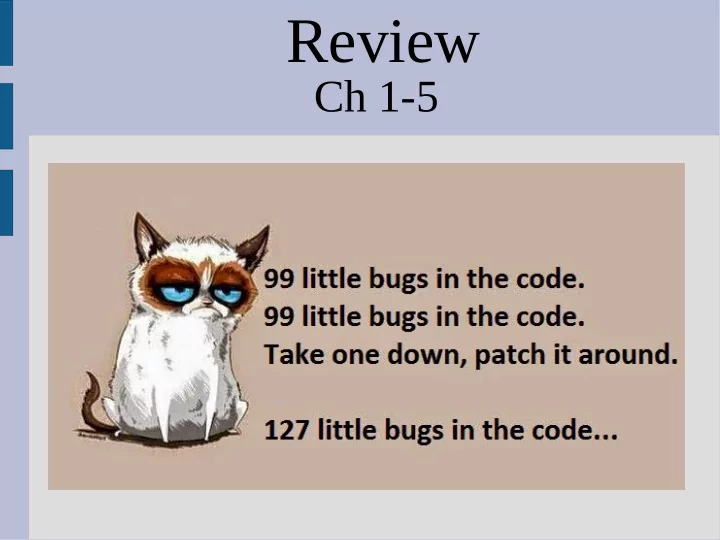

Review Ch 1-5
Executing code Compile code (convert from C++ to computer code) - Syntax errors will prevent compilation Run code - Runtime errors will crash your program - Logic errors will make your program give the wrong output
Syntax = car won't start Runtime = car accident Logic = bad directions
Identifiers The identifier is the name of a variable/method - Case sensitive - Must use only letters, numbers or _ - Cannot start with a number - (Some reserved identifiers) Examples (second word): int x, String s_o_s, double high2low
Primitive Types bool - True or false char - (character) A letter or number int - (integer) Whole numbers long - (long integers) Larger whole numbers float - Decimal numbers double - Larger decimal numbers doubles are approximations ints are exact but have a more limited range
cin cin >> x; By default, this will read the based off the type of x, until it finds a space or character not the same type as x getline(cin, x); x needs to be a string, but then stores everything up until you hit enter Note: mixing getline and “cin >>” ends poorly
Operations Order of precedence (higher operations first): -, +, ++, -- and ! (unary operators) *, / and % (binary operators) + and - (binary operators) Operators that change variables: ++, --, +=, -=, *=, /=, = Note: integer division happens if you divide two ints: int / int = int
If statements Logical operations: if (boolean expression) { > (greater than) // code == (equals) } < (less than) else { >= (greater than // more code or equal to) } != (not equal to) <= (less than || is the OR operations or equal to) && is the AND operations
Short-circuit evaluation Simple cases of short-circuit: When you have a bunch of ORs if( expression || exp || exp || exp ) Once it finds any true expression, if statement will be true When you have a bunch of ANDs if( expression && exp && exp && exp ) Once it finds any false expression, if statement will be false
Scope Variables only exist in the most recently started block: z lives in most recent block z goes away at corresponding closing block If you want variables to exist longer, you need to declare them further up in the program
Loops 3 parts to any (good) loop: - Loop variable initialized - boolean expression with loop variable - Loop variable updated inside loop for loops have these 3 parts in the same place while loops have these spread out do while loops are while loops that always execute at least once
Looping control commands continue restarts break stops loop loop immediately
Functions Function declaration (put before main or any other definition) Function definition
Functions function header (whole line) return type parameters (order matters!) return statement body The return statement value must be the same as the return type (or convertible)
Functions The “default” way when passing in variables to functions is to copy the value This makes a local variable in the function The “call-by-reference” way actually passes the variable into the function (i.e. memory address)
Recommend
More recommend